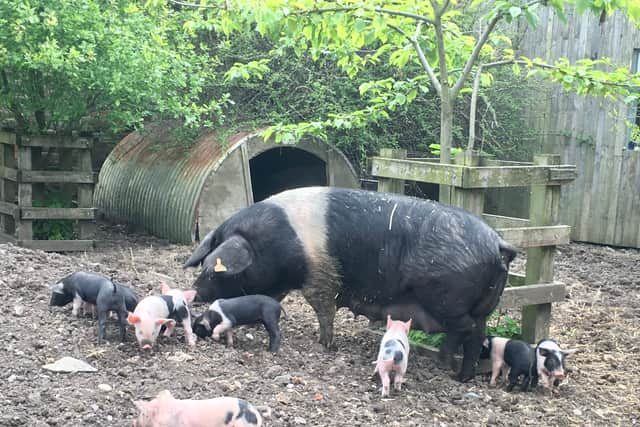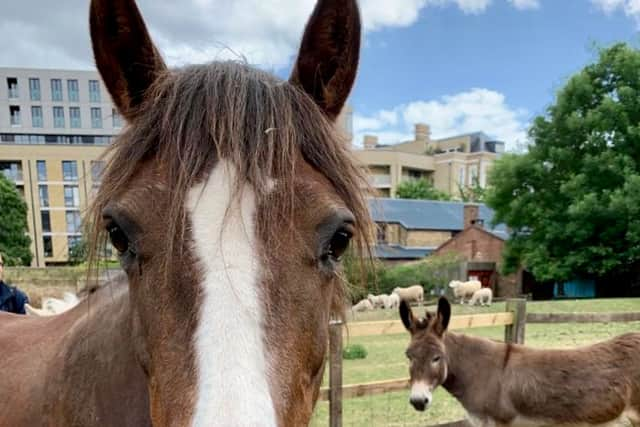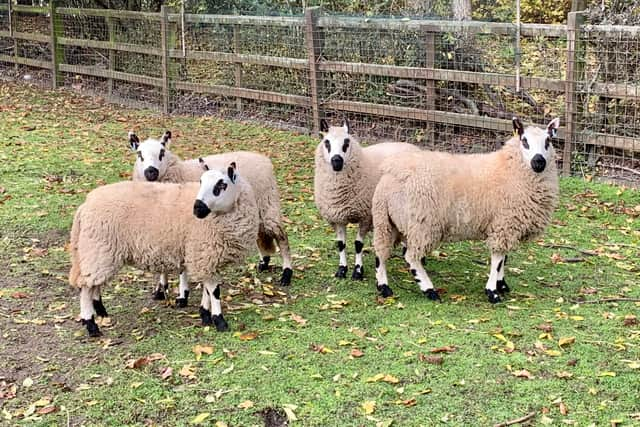Lay of the land: How Hackney City Farm is recovering from the Covid pandemic
and live on Freeview channel 276
I’m in a field surrounded by goats. One, Lola, is particularly interested in the almond croissant that’s in my bag.
I edge away a little nervously and feel a nudge in my back – it’s Clover the donkey wanting a head scratch.
Advertisement
Hide AdAdvertisement
Hide Ad“Behave you lot,” CJ, the livestock manager, laughs, leading the way into the farmyard where hens and geese scratch between the cobbles.
It’s hard to believe this pastoral idyll is unfolding in the middle of Hackney, yet over the sound of clucking I can just about hear the rumble of traffic from Hackney Road.
Beyond the fence, city types walk their dogs around Haggerston Park while yelling into their phones.
Within the fence all is serene – well nearly.
The hay has just been delivered and volunteers, many of whom are out of work or in need of job training, are heaving it off the truck to spread it around the handful of stalls and stables.
Advertisement
Hide AdAdvertisement
Hide Ad

Since the 1970s, city farms have spread throughout the UK – there are more than 100 represented by a charity called Social Farms & Gardens.
But the highest concentration is in London.
Hackney’s was founded in 1984 by a group of residents keen to teach urban children more about where their food comes from and give them access to green spaces.
Hackney Council has granted them a rent-free 99-year lease.
“Entry is free because being accessible is a central part of our ethos, so we mainly rely on donations,” CJ explains.
“Many parents can’t afford to take their kids out to the country and if it wasn’t for city farms they’d never get close to these animals.”
Advertisement
Hide AdAdvertisement
Hide Ad

Get there early enough and you can even buy the farm’s own eggs and honey from the 12 hives on the roof.
Also on site is an independent school with just 10 pupils, all of whom are at risk or have special education needs.
Advertisement
Hide AdAdvertisement
Hide AdUnder the shade of an apple tree in the blooming garden, CJ tells me more about how she ended up being an urban farmer.
“I was a bit naughty when I was 14 and my nan made me volunteer here to keep out of trouble,” she says.
“I just fell in love with the animals.”
She went on to study farm management at college and worked part time at various other London farms including Spitalfields and Newham.
“It’s so sad that Newham has just had to close due to lack of funding,” she continues
“It’s been a big part of the community since 1977.”
Advertisement
Hide AdAdvertisement
Hide Ad

Although it’s adored by local residents, funding is a constant worry for Hackney City Farm, particularly during the pandemic when it was forced to close to visitors.
All the staff were furloughed and the animals evacuated to farms in Kent apart from the goats, who were too heavily-pregnant to be moved.
Local residents took it in turns to feed and let them out every day.
“With no one around the yard there were some issues with dog attacks,” CJ says.
Advertisement
Hide AdAdvertisement
Hide Ad“Two huskies jumped the fence and killed one of our prime breeding geese.
“We also had to sell Hazel the horse’s baby, Luna, and two pigs, as we couldn’t afford to keep them.
“Luna’s being trained up well though and we sent the pigs to market rather than the slaughterhouse so people could save them if they wanted to.
“Yes we need to make money to survive, but we’re not here to make money from animals suffering.
Advertisement
Hide AdAdvertisement
Hide Ad“That’s why we don’t send the hens to slaughter once their laying days are behind them, we let them just retire and enjoy the yard.”
The farm is still running reduced hours as some of the staff are still furloughed, but is hoping to get back to normal in October.
“We can’t wait to get back up and running again,” CJ adds.
“The pandemic took it out of everyone and there’s nothing like spending time with animals to make you feel uplifted.”
As I stroke baby goats Sorrel, Tansy and Pepper’s floppy ears, I realise on just how true that is.
Comment Guidelines
National World encourages reader discussion on our stories. User feedback, insights and back-and-forth exchanges add a rich layer of context to reporting. Please review our Community Guidelines before commenting.